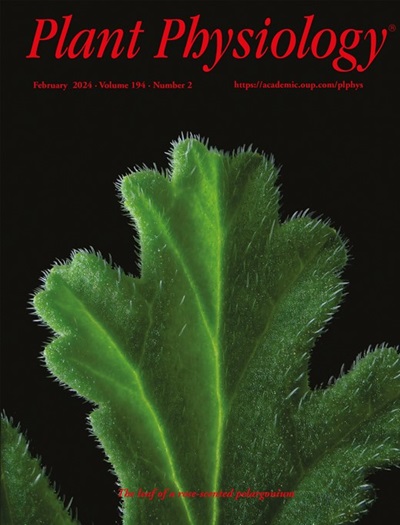lbcas12a诱导的6个进化支A型2C蛋白磷酸酶基因突变的未发芽拟南芥种子
IF 6.9
1区 生物学
Q1 PLANT SCIENCES
引用次数: 0
摘要
Cas12核酸酶,如Cas12a、Cas12i和Cas12f,是具有几个独特属性的基因组编辑工具。然而,各种Cas12变体在拟南芥(Arabidopsis thaliana)中多重基因组编辑的潜力仍然没有充分表征。在本报告中,我们系统地评估了18个额外的靶标,并证明携带D156R和E795L突变的LbCas12a变体表现出最小的靶标偏差。此外,我们在产生T1纯合子六重突变体方面实现了至少73.8%(45/61)的编辑效率,其中一半以上的突变体表现出完全的种子萌发抑制表型。通过对7个LbCas12a变异体的比较分析发现,优化核定位序列而非密码子的使用是提高编辑效率的基础,E795L突变与高效LbCas12a变异体的其他突变具有协同效应。对一种Cas12i3和两种AsCas12f变体的进一步研究表明,Cas12i3变体在拟南芥中也表现出足够高的编辑效率,尽管需要进一步改进以减轻其靶偏倚。总的来说,在这项研究中,我们开发了最有效的CRISPR/Cas工具,用于拟南芥的多重基因组编辑,正如在六个进化支A型2C蛋白磷酸酶基因中携带突变的永不发芽种子的高效生成所证明的那样。本文章由计算机程序翻译,如有差异,请以英文原文为准。
Never-Germinating Arabidopsis Seeds with LbCas12a-Induced Mutations in Six Clade A Type 2C Protein Phosphatase Genes.
Cas12 nucleases, such as Cas12a, Cas12i, and Cas12f, are genome-editing tools that possess several unique attributes. However, the potential of various Cas12 variants for multiplex genome editing in Arabidopsis (Arabidopsis thaliana) remains insufficiently characterized. In this report, we systematically evaluated 18 additional targets and demonstrated that the LbCas12a variant carrying D156R and E795L mutations exhibits minimal target bias. Furthermore, we achieved an editing efficiency of at least 73.8% (45/61) in generating T1 homozygous sextuple mutants, with more than half of these mutants exhibiting a complete seed germination arrest phenotype. Comparative analysis of seven LbCas12a variants revealed that the optimization of nuclear localization sequences, rather than codon usage, is fundamental for improved editing efficiency, and that the E795L mutation had synergistic effects with other mutations in highly efficient LbCas12a variants. Further investigation into one Cas12i3 and two AsCas12f variants showed that the Cas12i3 variant also exhibits sufficiently high editing efficiency in Arabidopsis, although additional refinements were required to mitigate its target bias. Collectively, in this study, we developed the most efficient CRISPR/Cas tool for multiplex genome editing in Arabidopsis, as demonstrated by the highly efficient generation of never-germinating seeds harboring mutations in six clade A type 2C protein phosphatase genes.
求助全文
通过发布文献求助,成功后即可免费获取论文全文。
去求助
来源期刊

Plant Physiology
生物-植物科学
CiteScore
12.20
自引率
5.40%
发文量
535
审稿时长
2.3 months
期刊介绍:
Plant Physiology® is a distinguished and highly respected journal with a rich history dating back to its establishment in 1926. It stands as a leading international publication in the field of plant biology, covering a comprehensive range of topics from the molecular and structural aspects of plant life to systems biology and ecophysiology. Recognized as the most highly cited journal in plant sciences, Plant Physiology® is a testament to its commitment to excellence and the dissemination of groundbreaking research.
As the official publication of the American Society of Plant Biologists, Plant Physiology® upholds rigorous peer-review standards, ensuring that the scientific community receives the highest quality research. The journal releases 12 issues annually, providing a steady stream of new findings and insights to its readership.
 求助内容:
求助内容: 应助结果提醒方式:
应助结果提醒方式:


